What is a K-12 Calendar Software?
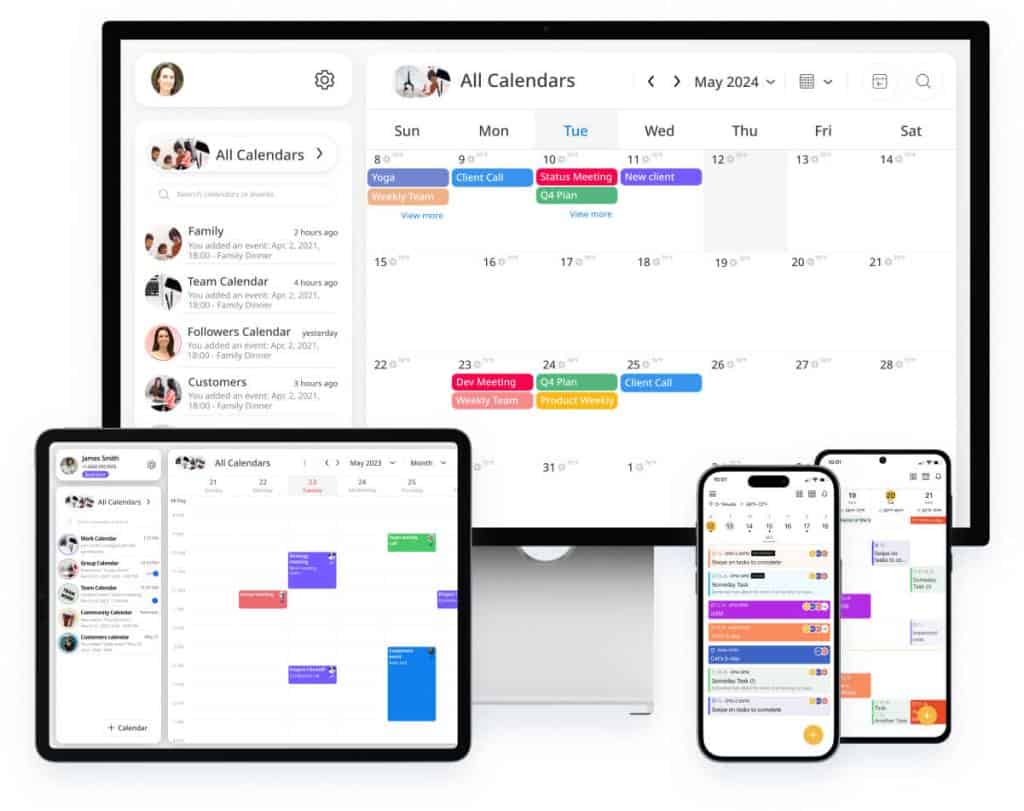
A K-12 calendar software or platform is a specialized scheduling tool designed for educational institutions that serve students from kindergarten to 12th grade. It is a comprehensive calendar system that encompasses the academic year, including important dates such as school holidays, teacher professional development days, parent-teacher conferences, and school events. The K-12 calendar serves as a central hub for managing and organizing various activities and events within the school, ensuring that students, teachers, administrators, and parents are well-informed and can effectively plan their schedules. It provides a structured overview of the academic year, including class schedules, exams, assignments, and extracurricular activities, allowing for efficient coordination and collaboration among all stakeholders. One key feature of such a k-12 Calendar app is being able to share calendars with multiple people. Syncing the calendar with parents, students, and stakeholders improves transparency and organization. Such shared and synced calendar streamlines communication, planning, and scheduling for a well-coordinated K-12 experience.
Importance of K-12 Calendar
The importance of a K-12 calendar lies in its ability to:
- Provide a structured overview of the academic year, including important dates, holidays, and school events.
- Facilitate efficient scheduling and coordination of classes, exams, and assignments.
- Enable effective communication among students, teachers, administrators, and parents regarding upcoming events and activities, by allowing sharing and synchronization of calendars and events. This ensures that everyone stays informed, aligned, and up-to-date with important dates, assignments, exams, and school activities.
- Enhance organization and time management skills for students, helping them stay on top of their academic responsibilities.
- Ensure that all stakeholders are well-informed about teacher professional development days, parent-teacher conferences, and other important school-related events.
- Streamline the planning and execution of extracurricular activities, clubs, and sports events.
- Help parents plan their schedules and make arrangements for their child’s education and involvement in school activities.
- Foster a sense of community and collaboration within the educational institution by promoting shared goals and coordinated efforts.
- Improve transparency and accountability by providing a centralized platform for accessing and sharing information about the school calendar.
- Enable effective resource allocation and allocation of staff and facilities based on scheduled activities and events.
Who Benefits from K-12 Calendar Software?
- Students: By keeping their calendar synced with school, a shared and synced K-12 calendar empowers students to stay organized, plan their studies, and manage their time effectively. It allows them to prepare for exams, complete assignments, and participate in extracurricular activities, while ensuring that all their calendars and events are automatically synced with parents and teachers.
- Teachers: By utilizing a shared and synced K-12 calendar, teachers gain a clear overview of the academic year, enabling them to plan lessons, schedule assessments, and coordinate with other teachers. They can easily communicate important dates and deadlines to students and parents, ensuring that everyone is on the same page.
- Parents: A shared and synced K-12 calendar enables parents to stay informed about their child’s academic schedule, including exam dates, parent-teacher conferences, and school events. It provides them with real-time updates and helps them plan their family’s activities while effortlessly staying connected with their child’s education.
- School Administrators: With a shared and synced K-12 calendar platform, school administrators can seamlessly coordinate various school activities, allocate resources, and plan events. It serves as a centralized hub for communicating important information to students, teachers, and parents, ensuring that everyone has access to the latest updates.
- Support Staff: Support staff, such as counselors, librarians, and cafeteria staff, benefit from a shared and synced K-12 calendar as it helps them align their services and availability with the school’s schedule. They can easily stay updated on events and adjust their responsibilities accordingly, fostering smooth operations within the educational institution.
Example of K-12 Calendars
School & Holiday Breaks
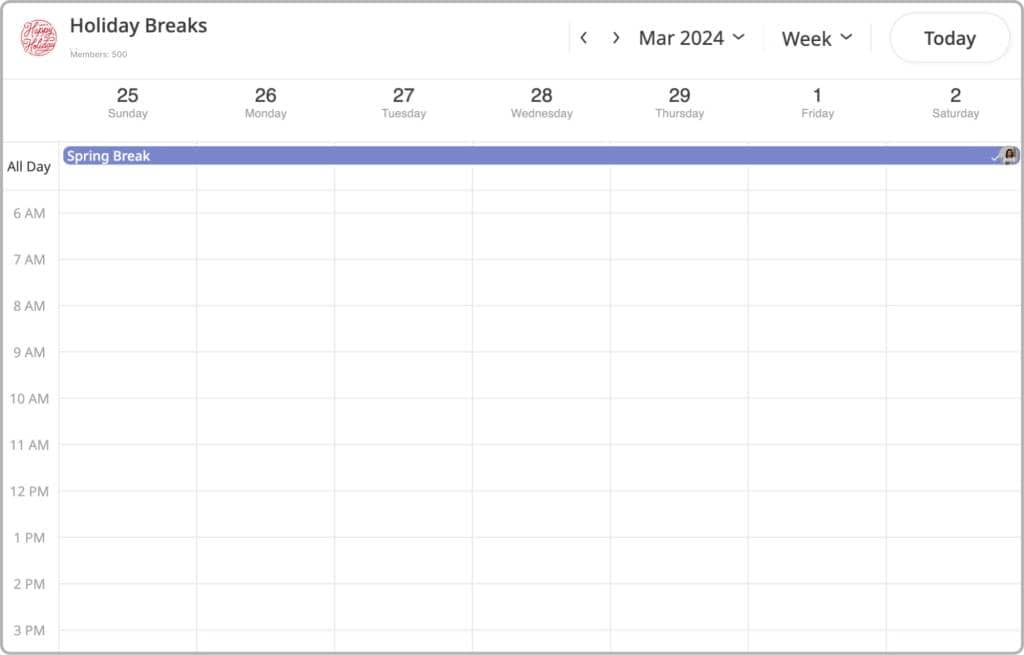
K-12 calendars play a crucial role in informing students, parents, and teachers about school breaks and holidays throughout the academic year. These breaks include summer vacations, winter holidays, spring breaks, and other scheduled time off. By having these dates clearly marked on the calendar, students and parents can plan family vacations, activities, and events accordingly. Teachers can also align their curriculum and lesson plans to accommodate these breaks. Additionally, school administrators can use the calendar to ensure proper staffing and resource allocation during these periods. Having school breaks clearly outlined in the K-12 calendar promotes better organization, reduces scheduling conflicts, and allows for effective planning and coordination within the educational community.
School Closures
School closures can occur due to various reasons, such as inclement weather, emergencies, or other unforeseen circumstances. K-12 calendars serve as a valuable tool to communicate these closures to students, parents, and staff members. By updating the calendar with school closure information, everyone is promptly notified and can adjust their plans accordingly. This ensures the safety and well-being of students and staff and helps minimize disruptions to the educational process. School closures can also be accompanied by alternative learning arrangements, such as remote learning or make-up days, which can be communicated and tracked through the calendar. Including school closures in the K-12 calendar promotes transparency, enables effective communication, and allows for smooth transitions during unforeseen circumstances.
Parent Teacher Conferences
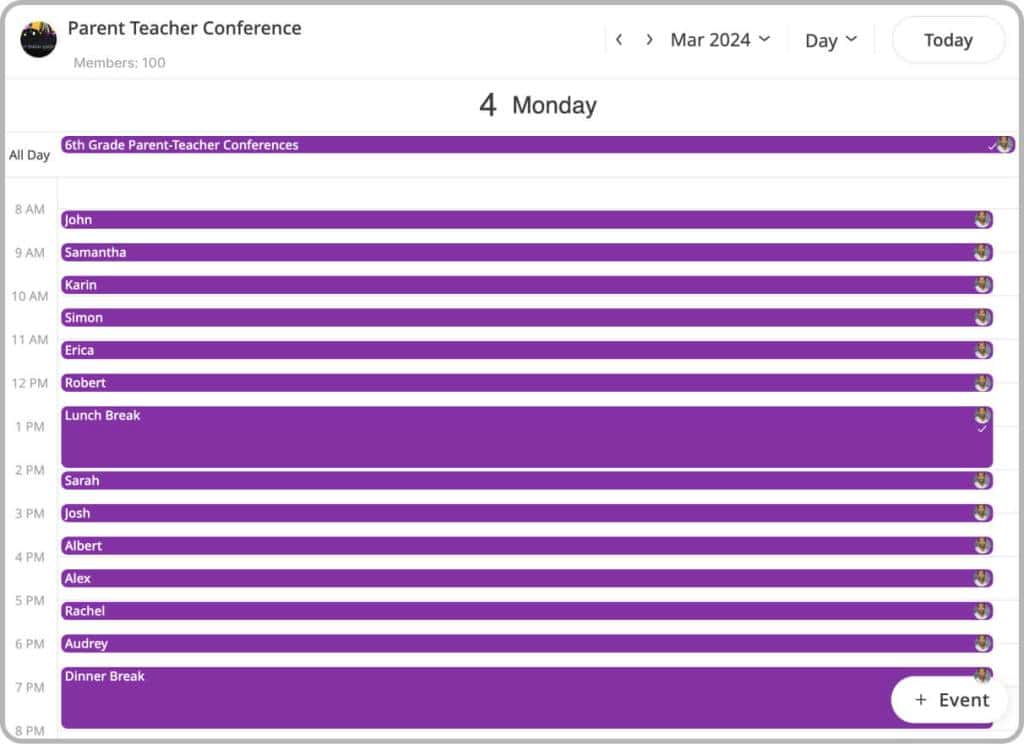
Parent-teacher conferences are essential for fostering strong relationships between parents and teachers and ensuring open lines of communication regarding a student’s progress. K-12 calendars play a crucial role in scheduling and organizing these conferences. By including parent-teacher conferences in the calendar, schools can efficiently coordinate meeting times and dates, allowing parents to book slots that best suit their availability. This helps eliminate scheduling conflicts and ensures that all parties involved can actively participate in the conference. Additionally, the K-12 calendar can provide reminders and notifications to both parents and teachers, ensuring that they are well-prepared for the conference and can make the most out of the valuable face-to-face time. Parent-teacher conferences listed in the K-12 calendar promote parent engagement, enable meaningful discussions about a student’s academic progress, and contribute to a collaborative and supportive educational environment.
School Events and Activities
K-12 schools are vibrant communities with a wide range of events and activities taking place throughout the year. From sports games and performances to club meetings and fundraisers, keeping track of these events is crucial for students, parents, and teachers. K-12 calendars serve as a centralized platform to showcase and manage school events and activities. By including them in the calendar, all stakeholders can stay informed about upcoming events, important dates, and any changes or updates. This promotes active participation and engagement within the school community. Students can plan their extracurricular involvement, parents can support their children by attending events, and teachers can effectively coordinate and communicate event details. A comprehensive K-12 calendar ensures that no event is overlooked, fosters a sense of community, and enriches the overall educational experience.
Exam Schedule
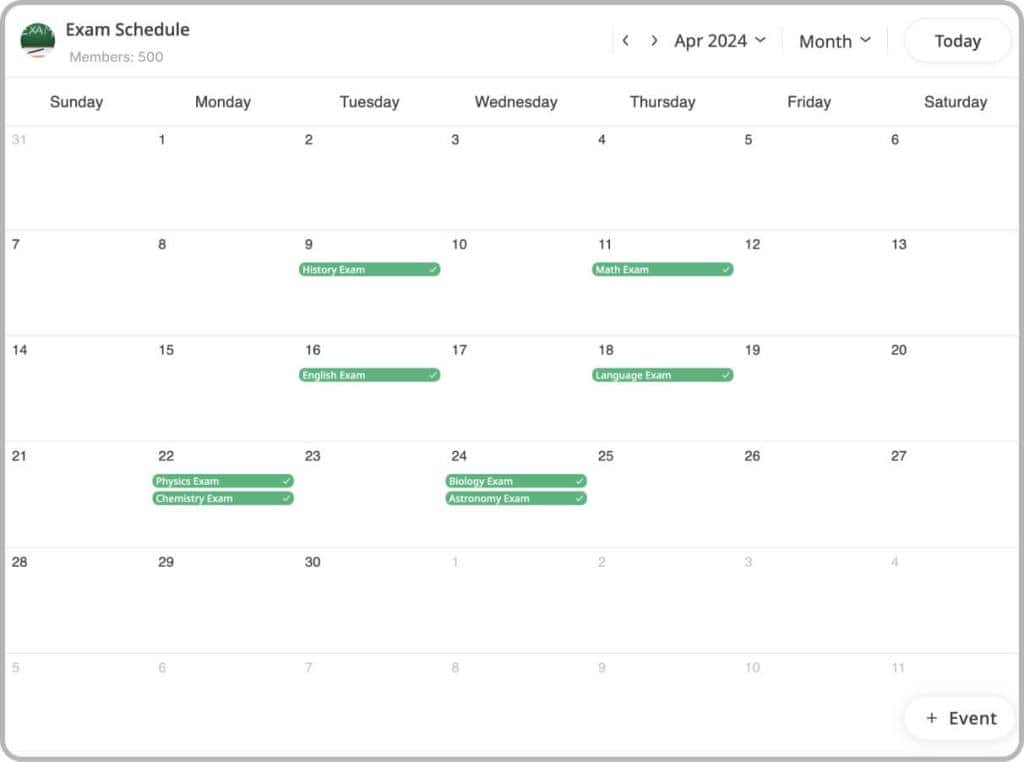
Exams are a significant part of a student’s academic journey, and having a well-organized exam schedule is essential for effective preparation and time management. K-12 calendars play a vital role in providing students, teachers, and parents with visibility into the exam schedule. By incorporating the exam dates, subjects, and locations into the calendar, students can plan their study routines, allocate time for revision, and avoid conflicts with other commitments. Teachers can easily communicate the exam schedule to their students and ensure a fair and structured assessment process. Parents can support their children by tracking exam dates and offering guidance and encouragement. The exam schedule on a K-12 calendar promotes accountability, reduces stress, and fosters a focused and successful approach to academic achievement.
Early Dismissal or Late Start Days
In the K-12 education system, there are often instances when schools have early dismissal or late start days due to various reasons such as staff meetings, professional development sessions, or inclement weather. These schedule changes can be challenging for students, parents, and staff to keep track of. A K-12 calendar can effectively address this by including early dismissal or late start days as events with specific start and end times. This allows all stakeholders to be aware of the altered schedule well in advance. Students can plan their transportation arrangements and adjust their study routines accordingly. Parents can make appropriate arrangements for childcare or transportation. Teachers can plan their lessons and communicate the schedule changes to their students. By incorporating early dismissal or late start days into the K-12 calendar, everyone stays informed and can smoothly navigate these schedule variations.
Important Deadlines
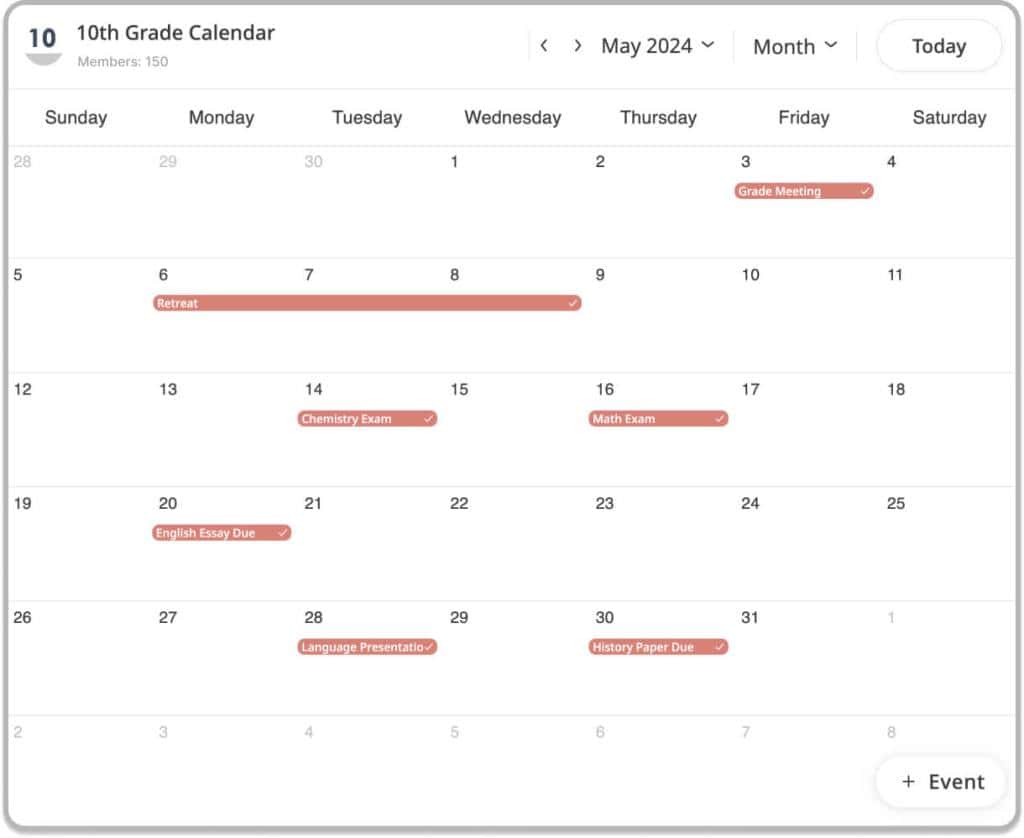
K-12 education involves various deadlines for assignments, projects, applications, registrations, and more. Keeping track of these deadlines is crucial for students, parents, and teachers to ensure timely submission and completion of tasks. A K-12 calendar serves as a centralized platform where all important deadlines can be recorded and shared. This allows students to stay organized, plan their work, and avoid last-minute rushes. Parents can support their children in meeting deadlines and ensuring they are prepared for upcoming assignments or exams. Teachers can set clear expectations and provide reminders for students regarding approaching deadlines. By incorporating important deadlines into the K-12 calendar, the entire educational community can effectively manage their tasks and responsibilities, fostering a culture of accountability and timely completion.
Why should one use K-12 Calendar Software instead of Traditional Calendar Apps?
K-12 shared calendar platform is preferable over traditional calendar apps due to its tailored features and functionalities for educational institutions. Traditional apps often lack specific tools for managing class schedules, assignments, and extracurricular activities. They may also lack collaboration and communication features necessary for effective coordination among students, teachers, and parents. Additionally, traditional apps may not offer specialized features like grade tracking or attendance management. In contrast, dedicated K-12 calendar software, such as GroupCal for K-12, addresses these needs with user-friendly interfaces, intuitive design, and seamless sharing and syncing capabilities among all stakeholders. This ensures that parents, students, and educators can easily access and update calendars, promoting effective communication and shared responsibility.
Why should one use GroupCal for a K-12 Calendar Platform?
GroupCal is an excellent choice for your K-12 calendar due to the following reasons:
- Easy collaboration: GroupCal facilitates seamless collaboration among multiple users, such as teachers, administrators, and parents. This ensures that all stakeholders can work together on the same calendar, promoting coordination and effective communication.
- Real-time updates: Any changes made to the calendar on GroupCal are instantly synchronized across all devices. This feature guarantees that everyone has access to the most up-to-date information, minimizing confusion and enhancing communication efficiency.
- Customizable permissions: GroupCal allows administrators to assign different roles and permissions to users. For instance, teachers can be granted editing rights to update events relevant to their classrooms, while parents may have view-only access to stay informed about important dates and events. This flexibility ensures that each user has appropriate access to the calendar’s information.
- Seamless sharing and synchronization: GroupCal for K-12 allows for the automatic syncing of calendars and events among all stakeholders, including parents, students, and educators.
- RSVP functionality: GroupCal’s RSVP feature is particularly valuable for K-12 calendars. It enables parents and students to confirm their attendance for events like parent-teacher conferences or school functions. This simplifies attendance management for organizers and helps them plan effectively.
- Cross-platform accessibility: GroupCal is compatible with iOS and Android devices, as well as computers. This means that users can conveniently access the K-12 calendar from their preferred devices, enhancing accessibility and ensuring widespread participation.
- Public calendar publication: GroupCal provides the option to easily publish public calendars on the school’s website. This feature allows schools to share important events and dates with the wider community, promoting transparency and engagement.
Implementing a dedicated K-12 calendar, such as GroupCal for K-12, is essential for effective organization, communication, and collaboration within the educational community. It provides specialized features like class schedules, assignment tracking, and attendance management. By centralizing information and facilitating communication, K-12 calendars streamline the management of school breaks, closures, conferences, events, exams, and deadlines. Moreover, the shared and synced nature of the calendar platform ensures that parents, students, and stakeholders are automatically updated with the latest information, promoting effective communication and shared responsibility. Investing in a dedicated K-12 calendar empowers schools, benefiting students, parents, and educators by creating a structured and efficient system that integrates seamlessly with their lives.